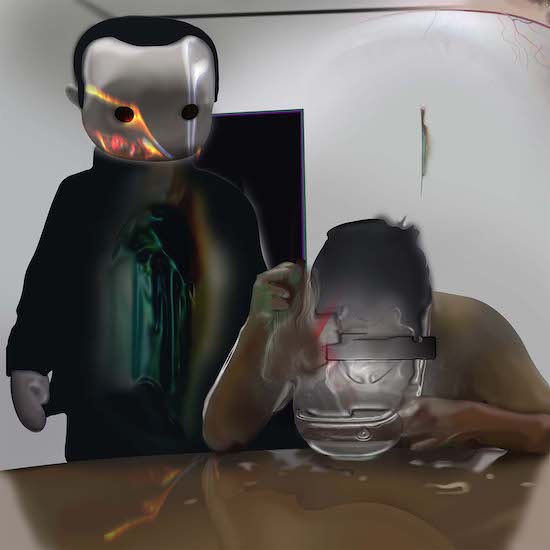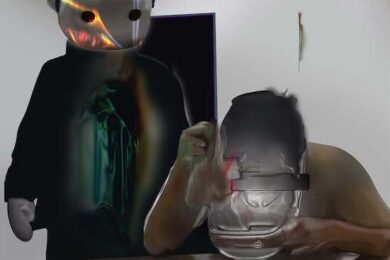There’s a concert video shared on Bloodz Boi’s Twitter of him performing ‘Hey Moon’, a track from 2020 originally produced in collaboration with bk beats and Katie Vick, live in Guangzhou. From the vantage point of the camera you see into the screen of someone else in the crowd’s phone filming. And that phone is, as well as picking up Bloodz Boi, also recording the screen of another phone recording the performance.
Through this ultra-meta, ultra-mediated thirty-odd second documentation of the live concert experience, Bloodz Boi sings, seemingly serene, barely moving. His voice is gently paced, every syllable delivered with carefully weighted conviction. Although the room is packed the performance feels intimate. The phones have an ambiguous relationship to that intimacy. Are they collecting personal mementos, or something to share far and wide?
More than a hypnotic quirk of a camera angle, there’s something about the live video that embodies a collision of private and public, a balancing act of shutting the world and welcoming it in. Bloodz Boi’s new album, a crying poem, recorded in collaboration with Claire Rousay and More Eaze (aka Mari Maurice) is doused in a similar feeling.
It comes across most vividly on ‘阴天 – Overcast’, the album’s final track. Bloodz Boi’s vocal, surrounded by webs of gentle sounds, feels private, hermetically sealed as though no-one else was meant to hear it. But as it weaves through gradually expanding electronic and acoustic orchestration, a counter melody asks, “What makes it special if you say it all the time?” And the track starts to soar.
Evoking something that’s both euphoric and tearful all at once, a crying poem hints at the ill-defined feeling that connects The Beach Boys’ ‘In My Room’ to Jimmy Eat World’s ‘The Middle’ via the more melancholy elements of the Kranky-roster. In other words, it’s music which carves out a space for reflection, and reaches to spread the comfort that comes from doing so.
Since 2019, Beijing-based Bloodz Boi has worked with producers and vocalists from across the globe. His weighty 2021 compilation, soundcloud discography, collects a chunk of these online team-ups (including two with Shanghai-born, London based producer Organ Tapes). His songs are played through intricate trap beats, blurry R&B and twinkling glitch ballads. Earlier this year he released 365, a collaboration with Swedish duo Quit Life, that carries his vocals along on monumental slabs of hazy trance pop.
His delivery remains consistent throughout the diverse collaborations in his back catalogue. At points mantra-like, it’s tentative without ever faltering. Melodic and minimal, insistent yet never nagging. His vocals come across like anxiety-reducing recitals, slowing down the energetic productions that surround them – even the world itself.
Rousay and More Eaze latch onto that effect. Collaborations between the pair have veered from the bouncing, hyper-pop influenced Never Stop Texting Me, to the visceral yet tender digital-acoustic ballads of An Afternoon Whine and If I Don’t Let Myself Be Happy Now Then When? On A Crying Poem, they split the difference, taking on a role something like the emo-ambient Wrecking Crew.
Through glistening violins, gentle guitars and intricate field recordings, the trio treat producing a pop song as augmenting reality, creating a moving backdrop that doesn’t so much shift Bloodz Boi’s voice, as the place of the listener in relation to it. At some points they pull you in closer by moving discreet sounds to the foreground. At others they manufacture space, shrouding the vocals in widescreen arrangements as though constantly toying with the gaps between the personal and the communal, looking out and looking in. Bloodz Boi’s vocals have a knack of sounding like they’re being whispered into your ear, while also begging for someone to sing along. Rousay and More Eaze run with that enigmatic quality.
Opener, ‘忧伤的贡多拉 – Sad Gondola’ initially situates us in immediate proximity, as acoustic guitar follows Bloodz Boi’s lulling vocals. It pivots as an autotuned voice chimes in, “Finding out that I fucked up, won’t you take me back?” A chorus of treated voices follows, shifting the song from what could have been an in-person message, to one that could fill a stadium. Third track ‘打火机 – The Lighter’ reverses that polarity. The lead riff sounds like it’s being played on a beleaguered enormodome trance synth, but when that drops out the verses could be being sung from a fort the trio have constructed in one of their bedrooms. It’s muffled, like a wave of adrenaline abruptly dissipated, yet the lulling quality of Bloodz Boi’s voice still cuts through.
Close to the end of Sean Baker’s 2015 film Tangerine, there’s a moment of uneasy catharsis as the characters all go their separate ways into the Los Angeles night. Sin-Dee Rella and Alexandra, the two sex workers whose voyage through LA on Christmas Eve is the story’s central narrative, split off into the streets. Sin-Dee seeks solace by going back to work. Alexandra follows in an attempt to reconcile with her friend. Ramzik, the taxi driver whose image as a heteronormative family man has been shattered, sits in his dark living room ruminating in the moody glow of a well-lit Christmas tree. Dinah, who’s spent much of the film being dragged through LA by Sin-Dee, wanders back to the brothel where she was abducted earlier in the story.
The entire film has a unique aesthetic due to the fact it’s shot entirely on three modified iPhone 5s. It gives this sequence a disorientating, familiar glow. Darkness is bathed in artificial light and the characters drift through somewhere in-between. It reiterates a theme that softly repeats through the movie, people stuck in a strange impasse, between behaving like they’re seeking solitude and making moves which seem to strive for human connection.
a crying poem sits in a similar zone between light and dark, introversion and extroversion. These songs feel shy, yet they also reach out. In that sense, they point to a complexity, a mutability in our personalities that could never be captured in the sliding scale of a Myers-Briggs test. There’s a vibe working through them that feels enclosed, yet its inseparable from a warm-heartedness that longs to share the experience.
Brian Wilson described ‘In My Room’ as “a song about somewhere where you could lock out the world, go to a secret little place, think, be, do whatever you have to do”. Bloodz Boi’s songs on a crying poem conjure something similar. Even if the language barrier means that, like me, you can’t understand all the lyrics, the weight of feeling behind them is inescapable.



